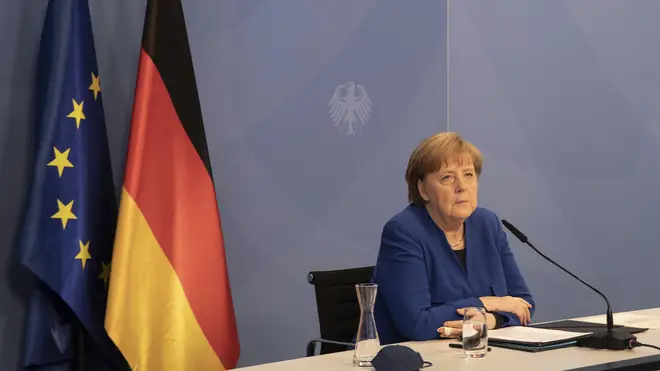
Shelagh Fogarty 1pm - 4pm
6 May 2021, 20:34

A spokeswoman for Angela Merkel said Germany is focused instead on how to increase vaccine manufacturers’ production capacity.
Germany has opposed the US call to expand access to Covid-19 vaccines for poor countries by removing patent protections on the jabs.
A spokeswoman for Chancellor Angela Merkel said: “The protection of intellectual property is a source of innovation and must remain so in the future.”
She said Germany is focused instead on how to increase vaccine manufacturers’ production capacity.
Activists and humanitarian institutions cheered after the US reversed course on Wednesday and called for a waiver of intellectual property protections on the vaccine.
The decision ultimately is up to the 164-member World Trade Organisation, and if just one country votes against a waiver, the proposal will fail.
The Biden administration announcement made the US the first country in the developed world with big vaccine manufacturing to publicly support the waiver idea floated by India and South Africa in October.
On Thursday, French President Emmanuel Macron embraced it as well.
“I completely favour this opening up of the intellectual property,” Mr Macron said at a vaccine centre.
However, like many pharmaceutical companies, Mr Macron insisted that a waiver would not solve the problem of access to vaccines.
He said manufacturers in places like Africa are not now equipped to make Covid-19 vaccines, so donations of shots from wealthier countries should be given priority instead.
Pfizer, Moderna, Johnson & Johnson and AstraZeneca — all companies with licensed Covid-19 vaccines — had no immediate comment, though Moderna has long said it will not pursue rivals for patent infringement during the pandemic.
US Secretary of State Antony Blinken underscored the urgency of moving fast now.
“On the current trajectory, if we don’t do more, if the entire world doesn’t do more, the world won’t be vaccinated until 2024,” he said in an interview with NBC while visiting Ukraine.
India, as expected, welcomed the move and Australian Prime Minister Scott Morrison called the US position “great news.”
Italian Foreign Minister Luigi Di Maio wrote on Facebook that the US announcement was “a very important signal” and that the world needs “free access” to patents for the vaccines, but Italian Premier Mario Draghi was more circumspect.
Russian President Vladimir Putin said his country would support it while UN Secretary-General Antonio Guterres welcomed the US decision too.
In closed-door talks at the WTO in recent months, Australia, Britain, Canada, the European Union, Japan, Norway, Singapore and the United States opposed the waiver idea, according to a Geneva-based trade official.

Some 80 countries, mostly developing ones, have supported the proposal, the official said. China and Russia — two other major Covid-19 vaccine makers — did not express a position but were open to further discussion, the official said.
EU Commission President Ursula von der Leyen said the 27-nation bloc is ready to talk about the idea, but she remained non-committal and emphasised that the EU has been exporting vaccines widely — while the US has not.
EU leaders said the bloc may discuss the matter at a summit that starts on Friday.
The pharmaceutical industry has argued that a waiver will do more harm than good in the long run.
Easing patent protections would eat into their profits, potentially reducing the incentives that push companies to innovate and make the kind of tremendous leaps they did with the Covid-19 vaccines, which have been churned out at an unprecedented pace.
Our priority is to ramp up production to achieve global vaccination.
At the same time we are open to discuss any other effective and pragmatic solution.
In this context we are ready to assess how the US proposal could help achieve that objective.
— Ursula von der Leyen (@vonderleyen) May 6, 2021
The industry has contended, too, that production of the vaccines is complicated and cannot increased simply by easing patent rights. Instead, it has said that reducing snarls in supply chains and shortages of ingredients is a more pressing issue.
The industry has insisted that a faster solution would be for rich countries to share their vaccine stockpiles with poorer ones.
“A waiver is the simple but the wrong answer to what is a complex problem,” said the International Federation of Pharmaceutical Manufacturers and Associations. “Waiving patents of Covid-19 vaccines will not increase production nor provide practical solutions needed to battle this global health crisis.”